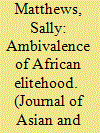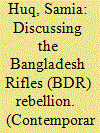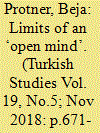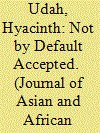|
|
|
Sort Order |
|
|
|
Items / Page
|
|
|
|
|
|
|
| Srl | Item |
| 1 |
ID:
096042


|
|
|
|
|
| Publication |
2010.
|
| Summary/Abstract |
Recent discussions in South Africa about the role of the so-called patriotic bourgeoisie highlight the much debated question of what role elite Africans can and ought to play in the upliftment of the poor. Those supporting the notion of a patriotic bourgeoisie believe that national or racial solidarity is sufficient to allow privileged Africans to act in the interests of their poorer fellow citizens. However, a reconsideration of an older discussion of African elitehood, that of Amilcar Cabral, suggests that something more may be needed before elites can act in the interests of the poor. Cabral argues that elites need to renounce their privilege and to live and struggle alongside the poor if pro-poor societal transformation is to be achieved. While Cabral may be right that shared racial or national identity is insufficient for elite solidarity with the poor, he does not consider all the complexities that arise when elites actually try to work with and for the poor. A consideration of the experiences of a long-standing Senegalese NGO reveal some of these complexities and suggest that any attempt by African elites to engage meaningfully in the upliftment of the poor, will inevitably involve continuous and difficult negotiation between paternalism and naïve egalitarianism.
|
|
|
|
|
|
|
|
|
|
|
|
|
|
|
|
| 2 |
ID:
106697


|
|
|
|
|
| Publication |
2011.
|
| Summary/Abstract |
This article explores the piety/politics nexus by asking what it means when educated, urban Bangladeshi women who are embracing religion anew claim that their pursuit of piety, and the learning circles that inspire it, are apolitical. I explain this self-proclaimed apolitical stance through women's own accounts of why and how they maintain political neutrality. The article demonstrates that organizers of many Islamic discussion circles in Dhaka consciously strive to attain a certain political neutrality, while allowing whoever is interested to attend, irrespective of the latter's political affinities. This decision stems from an understanding of the lack of trust that accompanies organized religion in Bangladesh, and its alliance, in the national imaginary, with the explicit political agenda of the Jama'at-i Islami. The article provides an account of different discussion circle members' varied articulation of political neutrality and how they draw from different ideas and discourses about being publicly religious in their molding of the ideal, pious, Bangladeshi woman. To exemplify the pious self-fashioning of urban, educated, Bangladeshi women, I will recount the ways in which several women discussed the March 2009 Bangladesh Rifles mutiny-a highly politically charged event. Women's accounts of the mutiny serve to unify lesson attendees around the cultivation of piety. Contestations over national politics and political affinities are made secondary, as women focus on giving an ethical bend to the deeply personal, subjective and gendered experiences of being educated and upwardly-mobile in present day urban Bangladesh.
|
|
|
|
|
|
|
|
|
|
|
|
|
|
|
|
| 3 |
ID:
161142


|
|
|
|
|
| Summary/Abstract |
The history of Turkey, as experienced by its minority populations, is characterized by instances of demographic and topographic engineering, war, dispossession, and political violence. Rather than being single historical events, these are longue durée systematic processes of Turkification that have continuity with contemporary political arrangements and privileges, despite the fact that the notion of Turkishness has been continuously changing. This article reflects on ethnographic research and interviews with liberal Turkish university students in Istanbul about the Turkish–Kurdish conflict, conducted during a time of relative peace and political optimism. It discusses Turkish liberals’ silencing of state violence and denial of privilege constituted through violence. This ‘forgetting’ is conceptualized as a continuous investment in Turkishness, which involves complicity. Such analysis of belonging might help to explain today’s lack of political mobilization and solidarity between the Kurdish movement and opposition groups in the present time of growing political oppression.
|
|
|
|
|
|
|
|
|
|
|
|
|
|
|
|
| 4 |
ID:
159768


|
|
|
|
|
| Summary/Abstract |
In the face of the increasing migration of black Africans to Australia, this paper seeks to raise conversations about the meta-discourses of Otherness in the Australian society. The paper aims to provide insights into black Africans’ experience of othering and being othered in Australia. The paper draws from a broader study which examined the lived experiences of Africans in South East Queensland and highlights that the presentation of white as norm in Australia, one of or the institutional and social contexts that create conditions reinforcing othering practices, is perpetuated, especially, when the racial order in society is not acknowledged and challenged. The paper proposes that the condition of Africans in Australia may not just be explained by their immigration status or their lack of skills but linked to how they are positioned and constructed in Australia as visible ‘Others.’
|
|
|
|
|
|
|
|
|
|
|
|
|
|
|
|
|
|
|
|
|